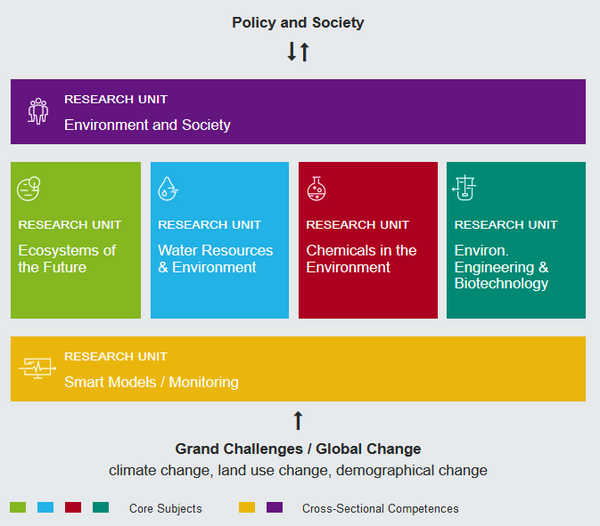
Founded in December 1991, the UFZ was the first and only research institute in the Helmholtz Association of German Research Centres to be exclusively dedicated to environmental research. It employs 1,189 (as of December 2019) staff and is 90% funded by the Federal Ministry of Education and Research, with the regional governments of Saxony and Saxony-Anhalt sharing the remaining 10 percent equally. UFZ is located in the cities of Leipzig, Halle and Magdeburg.
Our Vision
The UFZ is one of the world’s leading research centres in the field of environmental research, enjoying high social recognition. It demonstrates ways in which a sustainable use of our natural resource base is possible for the benefit of both humankind and the environment.
Our Mission
Biodiversity, functioning ecosystems, clean water and intact soils all make up our natural resource base. In the face of global change, employees at the Helmholtz Centre for Environmental Research – UFZ are united by the goal of demonstrating ways to combine societal development with a healthy environment.
The UFZ conducts excellent research and takes on a shaping role in the scientific community. As a reliable partner, the UFZ supports the political arena, the economy and the general public to better understand the consequences of human actions on the environment and to develop options for social decision - making processes. For this purpose, the UFZ responds to the stimuli created by society and by producing know - how and technologies that should help to rapidly identify problems comprising conflicting priorities between the environment and society. The UFZ will consequently work on precautionary measures.
In dealing with complex environmental issues, the disciplinary borders between the natural- , engineering- and social sciences need to be overcome. The UFZ has extensive competences in integrated environmental research. It boasts innovative scientifi c infrastructures and nurtures indispensable national and international cooperation, enabling problem - solving at the highest level.
Attractive working conditions, the creativity and motivation of UFZ employees, their personal and professional development, and the promotion of young scientists as leading international researchers are all key factors when it comes to successfully promoting this mission.
The UFZ´s research structure
The UFZ’s research is organized into six strategic research units, to which a total of 37 methodically organised departments are assigned. This range of departments emphasizes the breadth of specialist subjects and just how diverse research is at the UFZ.
The six UFZ Research Units:
- Ecosystems of the Future
- Water Resources and Environment
- Chemicals in the Environment
- Environmental Engineering and Biotechnology
- Smart Models / Monitoring
- Environment an Society
More about the six Research Units and the 37 Departments:
www.ufz.de/departments

The Helmholtz Association
The Helmholtz Association contributes towards solving major and pressing social, scientific and economic issues with scientific excellence in six research areas: Energy, Earth and Environment, Health, Key Technologies, Structure of Matter, Aeronautics, Aerospace and Transport. The Helmholtz Association is Germany’s largest scientific organisation with about 40,000 employees in 19 research centres and an annual budget of approximately 4.8 billion euros. Its work stands in the tradition of the naturalist Hermann von Helmholtz (1821-1894).